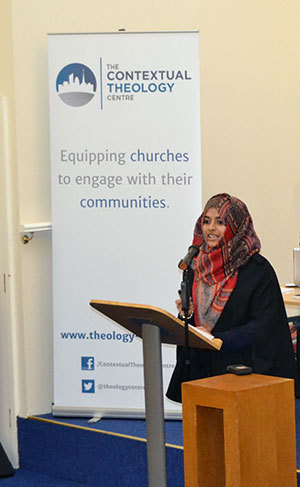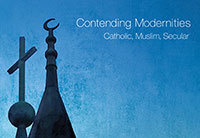 Ruhana Ali, a researcher and consultant working in Tower Hamlets, London, at a Contending Modernities conference
Ruhana Ali, a researcher and consultant working in Tower Hamlets, London, at a Contending Modernities conference
The powerful force of global migration was the focus of a conference Monday and Tuesday (Oct. 14 and 15) that showcased the research of the Global Migration Working Group — one of several research teams that are part of Contending Modernities, a Notre Dame-based research initiative that involves scholars from around the world.
The conference took place at the Notre Dame Centre in London and in the religiously and ethnically diverse borough of Tower Hamlets in East London. Participants included ethicists, theologians, historians and legal scholars from the United States, Europe, Canada and Australia; leaders of civil society organizations; members of the Bengali Muslim, English Jesuit and Anglican communities; and a member of Parliament from London’s most religiously and ethnically diverse district.
“The global expansion of migration in recent years has ushered in major social and economic changes, as well as profound ethical challenges concerning how people are to coexist in pluralistic societies,” said Scott Appleby, Notre Dame professor of history and peace studies, who directs Contending Modernities.
“London and other major urban centers in Western Europe and North America are living laboratories in which new models of pluralist citizenship are today being formulated, implemented and contested.”
The Archbishop of Dublin, Diarmuid Martin, built his keynote address on “the universal destination of the goods of creation,” a principle of Catholic social teaching that applies to intellectual property and to the freedom of movement of goods and services, "but also to the movements of the talents and aspirations of people.” Vincent Rougeau, dean of Boston College Law School, offered a critique of the legal philosophies underlying current laws restricting the rights of migrants and explored an alternative conception, jus nexi, which uses rootedness as a principle of membership acquisition.

Other conference participants, such as Ruhana Ali, a researcher and consultant working in Tower Hamlets, drew on the experience of Muslims and other religious minorities in the United Kingdom. David Barclay of East London’s Contextual Theology Centre — Notre Dame’s primary institutional partner in this working group — elaborated on “Making Multiculturalism Work,” his published report for Contending Modernities. This and other publications generated by the Global Migration Working Group are available online.
Contending Modernities brings religious and secular scholars, groups, communities and institutions into collaborative research and education projects for the common good. The initiative does so through the establishment of multidisciplinary, cross-cultural working groups of scholars, practitioners and public intellectuals. More information is available on the Contending Modernities website and on the project blog.
Contact: Scott Appleby, 574-631-5665, rappleby@nd.edu